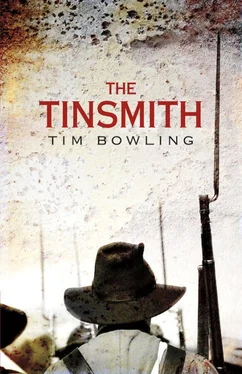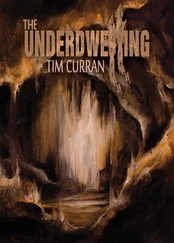But just then, the line began to move, like a chain made of flesh and muscle. The soldiers advanced as steadily and slowly as the black river of smoke above them. Soon blue and white coils shrouded the treetops and swallowed the troops—a few soldiers emerged in glimpses. As dawn broke, visibility decreased.
Pressed into the earth now, his head just above ground level, Anson peered into the tattered air, waiting for the first retreats of the wounded or the first advance of the enemy, hoping the two events would not occur together. He had given orders for the stretcher-bearers to clear the field, but where exactly was it? And when should he motion the bearers forward? The woodlot loomed like an iron gate between him and the battle. He heard the rippling and whish-whish-whish of musketry between the concussive explosions of the artillery, breathed in the battle’s rolling smoke, watched men plunge toward it, but could only wait to see the first staggering effects.
Minutes passed quickly, slowly. The wood was but a dozen rods away, far too close should the enemy surge through. But if that happened, at least a retreat would come first, some small advance warning of the need for Anson to gather his supplies and fall back until he could better do his duty in the field hospital a mile to the rear.
He did not fall back. The wounded appeared, blue shadows helped by other blue shadows; the ripping of artillery seemed to tear the shadows out of the smoke itself. Anson jumped up and ran forward; he shouted at the stretcher-bearers to go into the woods. If they waited much longer to aid the fallen, too many men would leave the lines, damning the Union’s cause and rendering his own charges almost useless. He shouted again, and to his surprise the men sprinted for the woods.
Within minutes, he saw Everitt and Cole emerge from the smoke. Moving their heads like horses struggling against the reins, they staggered to the hollow; all Anson could see of the soldier on the stretcher between them were his dangling arms.
“Put him here!” Anson shouted into the din. Failing to hear his own voice, he gestured to a spot below the lip of the hollow, which was itself no more than two feet deep and thirty wide—a meagre protection, but better than nothing.
The stretcher-bearers lifted the wounded soldier off the stretcher and onto the ground. Anson immediately dropped to his knees to shelter the man from a spray of dirt and rock thrown up by a shell.
The soldier, a man named Rufus Troy, was near Anson’s age, with a thick beard matted with dirt and a hairline so receded that the shocked and trembling face, greasy as butter around the black smudges of gunpowder, loomed unnaturally large. Troy’s lips glistened red, as if bloodied, and his dark eyes, though fluttering with pain, never completely closed. Through chattering teeth, he gasped, “Foot… it’s my foot.”
Anson pressed a flask of whisky to the man’s mouth and watched the Adam’s apple throb four times in rapid succession. Then he gently removed the fragments of boot and inspected the wound. The left foot had been shattered, likely by a shell fragment, and resembled a dirty, bloodied sack filled with shards of chalk. Despite the urgent need to act as quickly as possible and to stay focused on the present, Anson’s thoughts raced ahead to the work he’d do at the field hospital. The foot would have to come off, a very difficult procedure he’d attempted only once, albeit successfully. He’d have to disarticulate through the ankle joint, saw off a thin slice of the end of the tibia with the malleolar projections. Grimly, Anson splinted the leg as best he could, then waved an ambulance-man over, all the while running the operation through his head. The trickiest part, by far, was shelling the os calcis out of the heel pad. If that wasn’t done properly…
But he also understood that the circumstances of battle might not even bring this soldier into his presence again. Mere seconds after the ambulance-man had borne the soldier to a nearby wagon, another victim of the conflict, this one much younger and a stranger, collapsed over the lip of the hollow, almost scattering Anson’s precious supply of bottled chloroform.
For two hours the artillery pounded and screeched: it let up only long enough to allow the crackle of musket fire, shouts of men, and severed neighs of horses to penetrate the sudden, eerie silences. At one point, out of the frayed rags of the battle, several cows lumbered straight toward Anson. Blood hung from them in broken strings and ropes, their heads swung wildly, their eyes resembled lead balls sticking out of fresh wounds. Anson threw himself over the body of the wounded man on the ground in front of him as the cows bellowed past, a sudden flash of light throwing their red-frothed hides into a vivid relief that lasted but a second. Then he raised himself from the oblivious soldier and, with his index finger, pushed into the messy hole beneath the clavicle, searching for lead. The soldier—a young man with corn-gold hair and beard—gasped as Anson’s finger probed deeper without success. But where, then, was the exit wound? As gently as possible, Anson turned the soldier onto his side. From previous experience, he knew that the trajectory of the minie ball was erratic; so much depended on the angle of deflection by the bone. In this case, the ball must have remained within the upper chest or neck, for he could find no corresponding exit wound. Frustrated, he ordered another ambulance-man over and then turned to the ginger-haired youth on the ground with the lead ball lodged in his lower maxillary and the eyes soft and brown as a newborn calf’s.
Anson’s sense of time vanished. Rapidly, he dressed wounds, dispensed whisky and opium, and made snap decisions about which of the wounded needed to be placed in the nearby wagons and hurried to the field hospital and which could walk the mile back on their own. Choking on the sulphurous smoke, his voice hoarse from shouting orders to Felix and the stretcher- and ambulance-men, Anson saw only the blurred faces of misery and pleading bob up out of the din and swirl of motion. Once, after tightening a tourniquet on a fractured arm, he looked at the sun. It burned dully, a smudge of yellow beaten thin by the battle smoke and the clouds of dust kicked up by fresh troops rushing forward. The day itself seemed checked—certainly time did not progress in the usual fashion. For twenty minutes afterwards, all the soldiers brought in by the stretcher-men were either dead or well on their way to death—and presumably these had been the best candidates for survival. God alone knew what condition of suffering the stretcher-men had determined to be hopeless—soldiers blown to pieces, headless, limbless, their insides on the outside. Judging by some of the wounds—bones shattered by minie balls and shell fragments, bones that would be impossible to repair even under peaceful circumstances, Anson knew his surgical skills would soon be required at the field hospital a mile to the rear.
Around seven o’clock, a longer lull in the fighting occurred. An officer on horseback emerged out of the threads of smoke, his severely drawn, Spanish-dark face like an unexploded shell hanging in the air.
“We’ve got ’em now, by God! They’ll soon be on the run!”
A stretcher-man dropped into the hollow. The wounded man who thudded to the ground behind him screamed, “Shoot me! Please, God, kill me!” He clutched his left leg. It flailed like a corn stalk in a breeze.
A neat formation of drawn faces with sickening grins marched past beyond the mounted officer. They all turned to the wounded man’s screams. The officer pulled the reins and spun around.
“Give ’em hell, boys! They can’t hold out much longer!”
Then he kicked the horse’s flanks and disappeared.
Читать дальше












